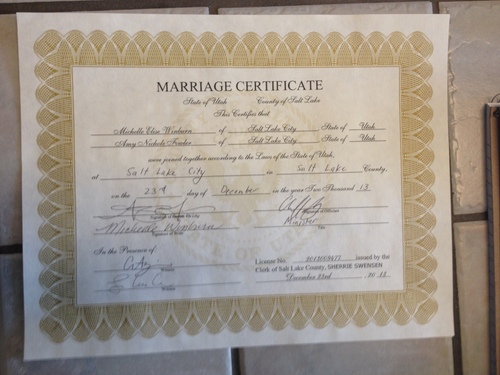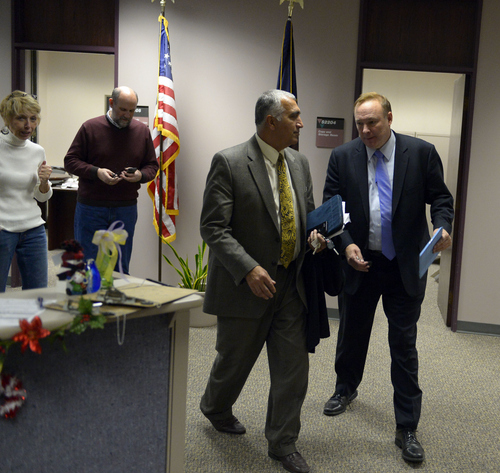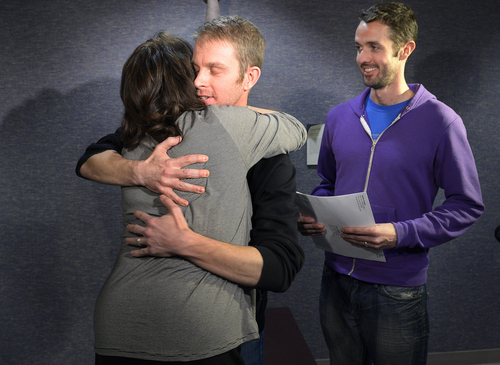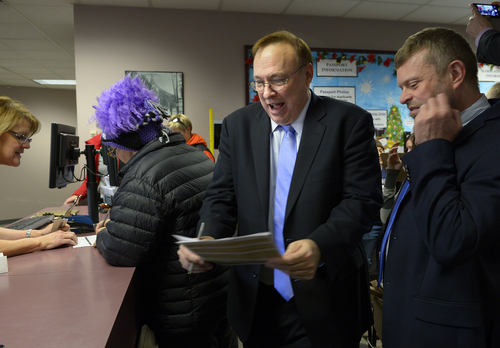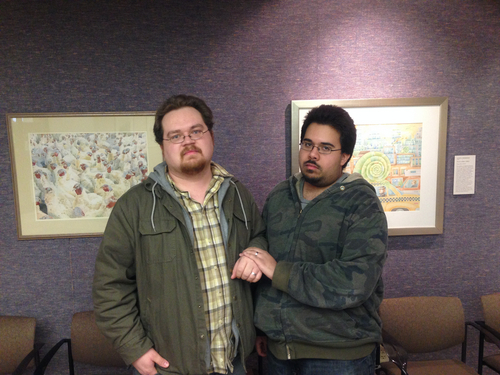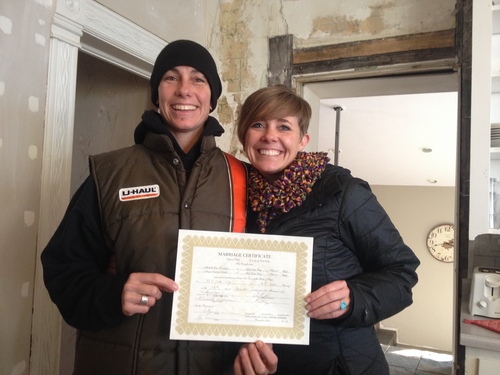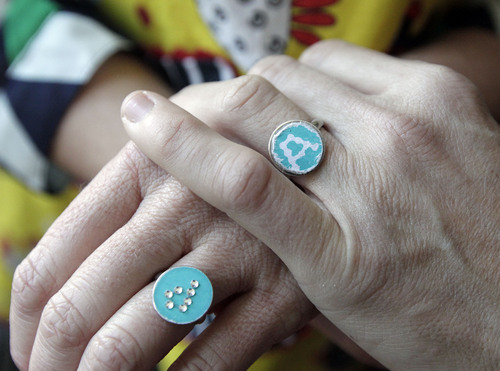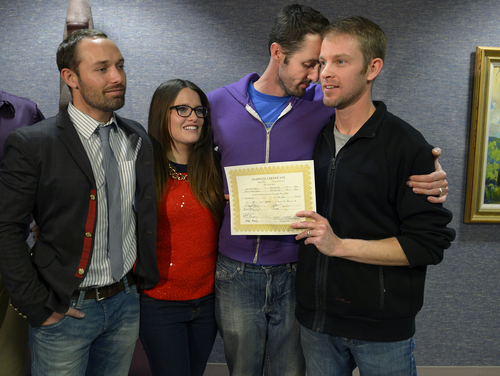This is an archived article that was published on sltrib.com in 2014, and information in the article may be outdated. It is provided only for personal research purposes and may not be reprinted.
The state will not recognize the validity of marriages that occurred before the U.S. Supreme Court stayed a district court judge's decision overturning a ban on gay marriage, the governor's office announced Wednesday.
In a letter to state agencies, Derek Miller, chief of staff to Gov. Gary Herbert, said those marriages will be "on hold" while it appeals the decision by U.S. District Court Judge Robert J. Shelby.
"Please understand this position is not intended to comment on the legal status of those same-sex marriages," the letter said. "That is for the courts to decide."
With a stay in place, the original laws governing marriage in Utah are again in effect. In his letter, Miller told state agency directors that the state's existing law prohibits not only performing same-sex marriages, but also recognizing them. Clerks in Utah's 29 counties estimate they issued more than 1,300 marriage licenses in the 17 days before the stay was granted.
"Wherever individuals are in the process of availing themselves of state services related to same-sex marital status, that process is on hold and will stay exactly in that position until a final court decision is issued," the letter said.
If couples had already received, for example, new driver licenses reflecting new names, those licenses will not be revoked, the letter said. But couples may not now seek new licenses.
"If someone was four steps along in the process, they stop at step four and they remain at step four until we get further direction from the court," Miller said.
Likewise, if a couple had completed a process — whether that was filing for health insurance coverage or preparing joint taxes — they are now frozen at that point, he said.
"Wherever anyone was at, that is now frozen in time until we receive further direction from the courts," Miller said. "We recognize it is the courts that will decide the validity and legality of those same-sex marriages. But we do need to follow the law, and the law tells us we are prohibited from recognizing those marriages."
Miller also said licenses, valid for 30 days, issued to couples who had not yet married would be frozen, too, until there is a final court decision.
The state's decision has attracted the attention of the U.S. Department of Justice, which confirmed Wednesday that it is reviewing the governor's decision.
Amy Fowler, 35, who married partner of three years Pidge Winburn, 37, at the Salt Lake County Clerk's Office on Dec. 30, said it was "heart-wrenching" to have those rights — at least in the interim — taken away.
"Before we were able to get married, we sort of knew … we knew the line of 'Here are the things that we don't get. We live in Utah and we choose to live here and so whatever, we'll put up with this. One day it will change,'" she said. "And then in a blink of an eye, all of that changes. And lo and behold, the earth did not open up and swallow Salt Lake City."
Fowler said same-sex couples were in the process of evaluating their insurance, taxes and even adoptions, and now, "We're back to Square One, but with the most devastating feeling."
Utah Attorney General Sean Reyes informed the governor that his office had been unable to reach a legal conclusion on the "ultimate validity" of same-sex marriages performed between Dec. 20, when Shelby ruled, and Jan. 6, when the Supreme Court granted the state's request for a stay.
"That question remains unanswered, and the answer will depend on the result of the appeal process," Reyes said Wednesday.
He said a review team has been set up to advise state agencies on a case-by-case basis about what to do now.
"We acknowledge that this is a very difficult situation for many," Reyes said in a statement. "It was the reason our office sought the stay of the district court's decision immediately. We wanted to avoid the untenable situation in which many of our citizens find themselves. We are diligently seeking certainty for all Utahns through a proper and orderly legal process."
The 10th Circuit Court of Appeals has set an expedited briefing schedule for the appeal, with all filings from both sides due by the end of February. It has not yet set a date for oral arguments in the case.
Peggy A. Tomsic, who with James E. Magleby represents three same-sex couples who challenged Utah's Amendment 3, called the decision "unprecedented and disappointing."
The decision "harms not only my clients, but hundreds of other same-sex couples who also were legally married, and whose families have been needlessly destabilized and stripped of basic legal protection," Tomsic said in a statement. "Regardless of how the state believes the 10th Circuit will ultimately rule, these couples are legally married, and the state should treat them accordingly."
Tomsic said married couples were encouraged to consult their own attorneys about what to do in light of the state's decision.
Michael Ferguson was the first to wed Dec. 20 at the Salt Lake County Clerk's Office, having rushed over with his partner, Seth Anderson, from The Queens' Tea shop that they own. They were both working again Wednesday when they learned about Herbert's order, which prompted a very different reaction than Shelby's ruling.
"It was this realization of like, 'Wow, Gov. Herbert really hates our families so much that he will spend any amount of money to break apart our families,'" Ferguson said.
Ferguson said he and Anderson will continue to relish the joy of being newlyweds. But they had begun to look into joining the same insurance plan at the University of Utah and filing taxes jointly both as residents and business owners — and even if they hadn't taken such steps, he shouldn't have to justify his indignation.
"I get really annoyed when the conversation is how big or small the inconveniences are for second-class citizens," he said.
Weston Clark is a stay-at-home dad in Salt Lake City. He and partner Brandon Mark have a 3-year-old adopted son, Xander, and just this week added a 7-day-old baby girl named Zoe to their family.
They were married at the clerk's office by Salt Lake City Mayor Ralph Becker Dec. 20 after seeing photos posted by Anderson on social media and realizing that Shelby's ruling made it possible. Even then, Clark felt the state would likely invalidate the marriage. But if it doesn't quite surprise him, Herbert's order on Wednesday — and his mention of protecting Utah families — does anger him.
"His attempt to not recognize my marriage puts my kids in jeopardy and endangers their security," Clark said. "If that's what he believes is important to protect families, then I think his concept of protecting Utah families is all sorts of messed-up."
Doug NeJaime, a law professor at UC Irvine School of Law in California, said the line the state intends to draw between actions taken or not taken could be hard to maintain.
"What if a couple requested health benefits before this and continue to access going forward," NeJaime said. "There are ways in which this is going to create a lot of questions for people in state government."
The other big question, NeJaime added, is the different consideration same-sex couples may receive from the federal government versus the state government, which is also occurring in other states where gay marriage is not recognized.
That said, he called the state's decision a "middle position."
"They are not saying the marriages are void," NeJaime said. "And they are not commenting on the ultimate validity of them. It's a middle position that they are trying to carefully carve out, it seems."
The ACLU of Utah sent Reyes a letter Wednesday offering its opinion that the state should recognize any marriages that occurred before the Supreme Court issued a stay.
"These marriages are valid and have vested the married couples with rights that the state and federal government must recognize," said John Mejia, legal director, in that letter. "Any efforts to retroactively invalidate those licenses would fail because these marriages are protected by the due process guarantees of the Utah and United States constitutions."
On Wednesday afternoon, the ACLU tweeted that it is seeking plaintiffs for a lawsuit to protect rights of same-sex couples who married in Utah.
The ACLU said in its letter that the "precise issue" at stake in Utah has not been addressed by any court, but several courts have ruled in similar cases that marriages cannot be retroactively invalidated.
The California Supreme Court, for example, in 2004 initially invalidated 4,000 marriage licenses issued by clerks in San Francisco in defiance of state law but then, after couples sued, ruled in May 2008 that same-sex marriage was a fundamental, protected right. That upended a ban on gay marriage in place since 2000.
Some 18,000 California couples had married by Nov. 4, 2008, when voters passed Proposition 8 to again ban same-sex marriages. About two months after the general election, the California Supreme Court ruled the marriages that occurred before passage of Proposition 8 were valid.
Bill Duncan, president of the Marriage Law Foundation and the Sutherland Institute's Center on Family and Society, said the state's decision was the "obvious" one.
"There is hardly a lot of choice the governor had," Duncan said. "The situation Shelby created when he refused to issue a stay has created a lot of confusion about the status of those who took advantage [of the situation] and got marriage licenses. We are not quite sure what the legal status of those marriages would be. There was a lot of uncertainty injected into the situation by the failure to issue a stay."
But the governor's choice wasn't so clear in the eyes of others. Utah Democratic Party chairman and state Sen. Jim Dabakis says the Herbert's directive was unexpected.
"This is the governor deciding unilaterally — taking all power to himself — to destroy more than 1,000 loving marriages and leave hundreds of children without two parents," he said. "On a whim. It's outrageous."
Dabakis says he and partner Stephen Justeson waited 27 years to be legally married in the state they call home, and joked that "they can take that wedding certificate out of my cold, dead hands." Shelby's Dec. 20 ruling rendered legal all of the marriages that occurred, Dabakis says, and the state is overstepping its authority by refusing to recognize those marriages.
"Stay means stop," he said. "It doesn't mean, go back and change history. Those were legal, lawful marriage licenses given by the state of Utah."
Brigham Young University law professor and Amendment 3 co-author Lynn Wardle had not yet read Herbert's letter but said there is some merit to Dabakis' argument that a stay does not apply retroactively.
"At the same time, I would also say that the governor's position is pretty valid," he said, adding that it took courage for Herbert to take a position that is unpopular in some pockets.
Wardle said he feels the state will win on an eventual appeal to the Supreme Court — "The 10th Circuit is too insecure to not do what they think is the latest trend" — but that people who were married while Shelby's order was in effect were following the law of the land.
"I tend to believe that you have to rely on the law, even if it's a bad law," he said.
But he doesn't have much sympathy for them, personally.
"The opportunists who have lined up to get marriage licenses, they knew what they were doing," he said. "It's a political act. It's designed to create headlines and generate attention."
Twitter: @Brooke4Trib
Twitter: @matthew_piper —
Love Elevated — a mass reception for Utah's same-sex marriages
QSaltLake, Le Croissant Catering, X96 and UtahGayWeddings.com are teaming to host "Love Elevated," a celebration of same-sex marriages that occurred in the 17 days since U.S. District Judge Robert Shelby's ruling. The all-ages event will be held Saturday at The Rail Event Center, 235 N. 500 West, with donations going toward Restore Our Humanity — the group that funded the lawsuit. Doors open at 6 p.m.


